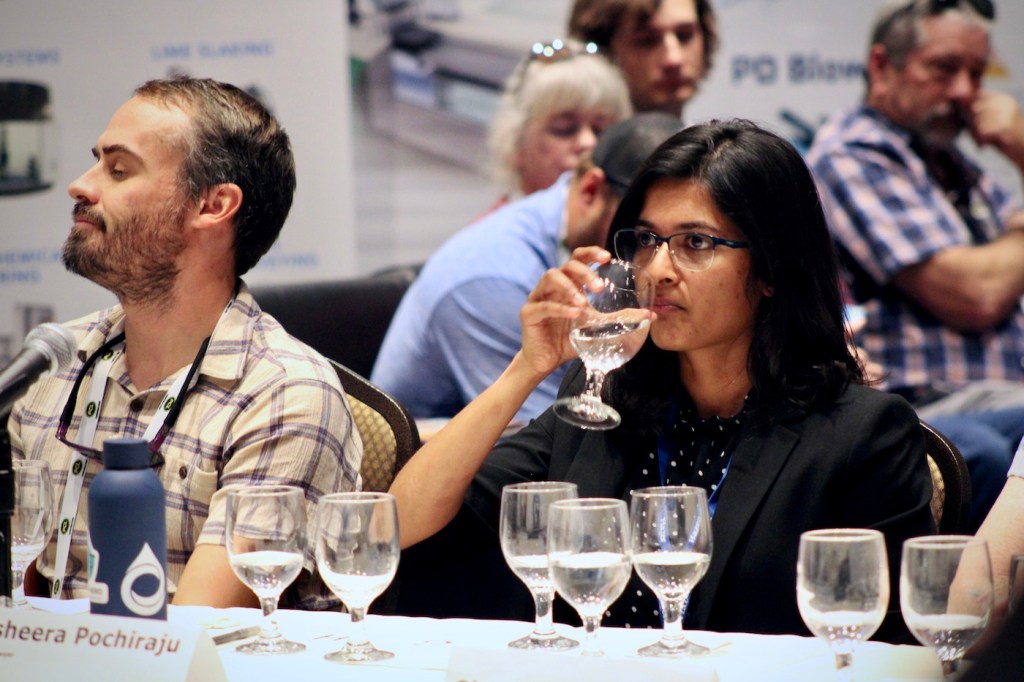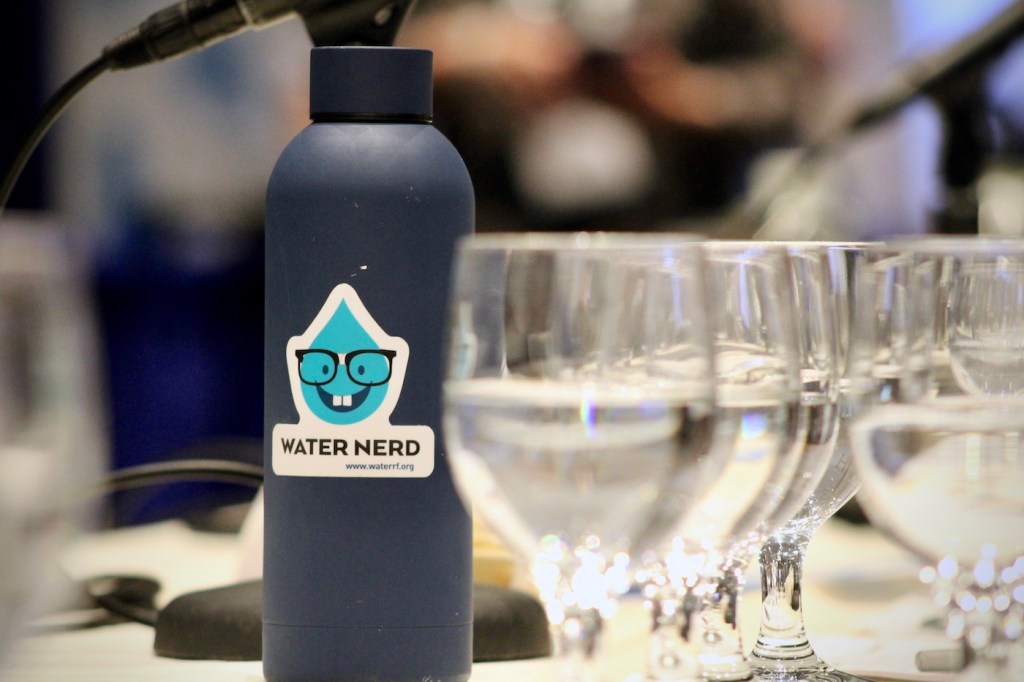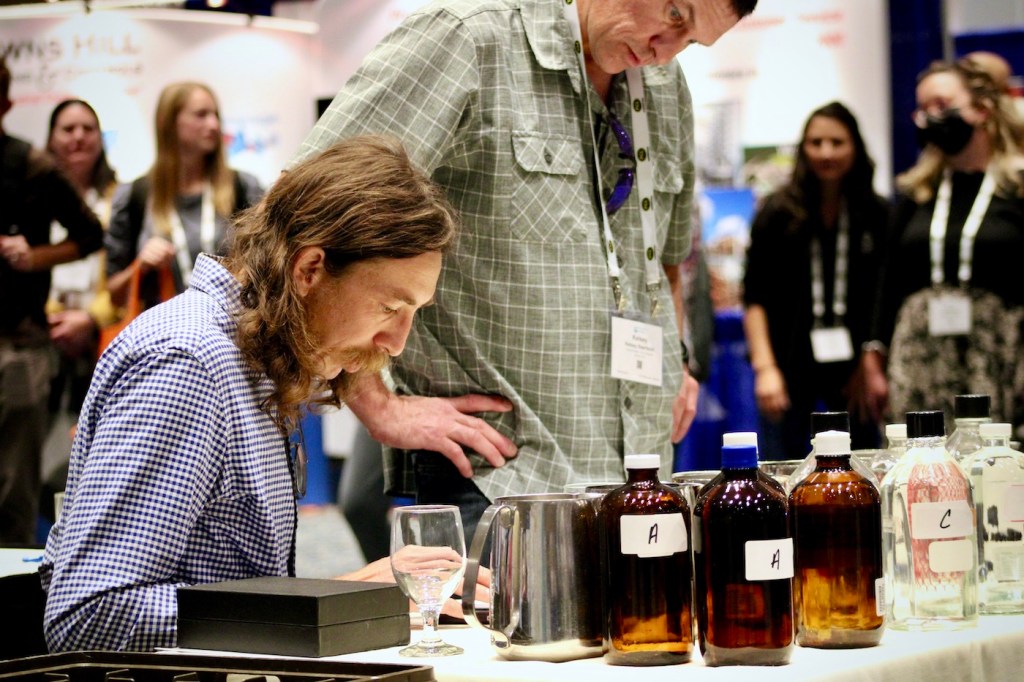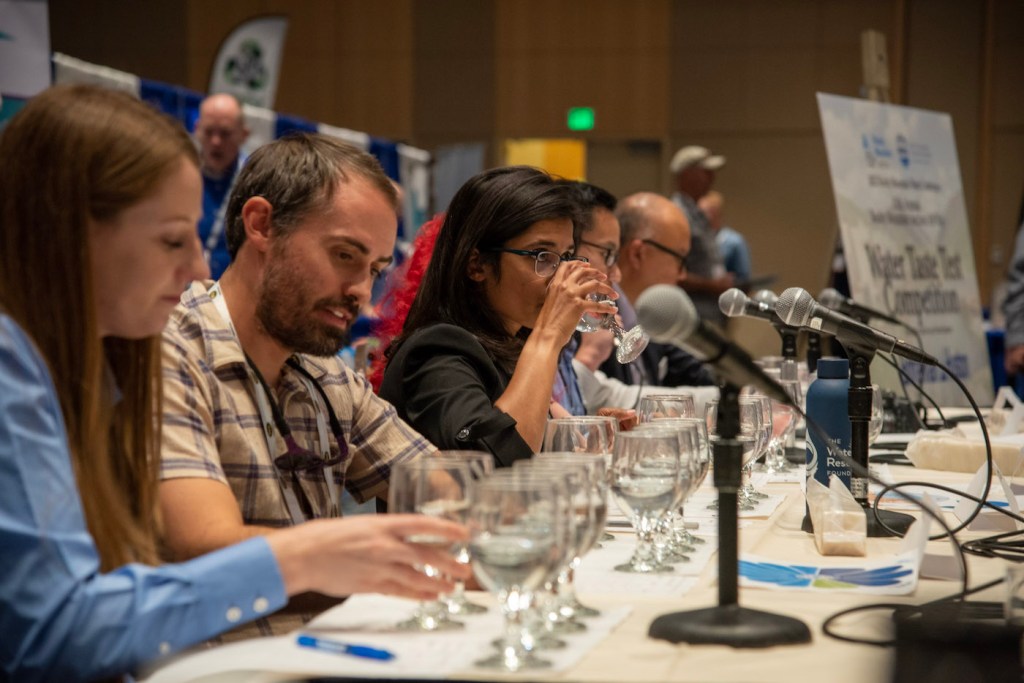Putting Tap Water To The Test
6:12 minutes

 This article is part of The State of Science, a series featuring science stories from public radio stations across the United States. This story, by Alex Hager, was originally published by KUNC.
This article is part of The State of Science, a series featuring science stories from public radio stations across the United States. This story, by Alex Hager, was originally published by KUNC.
Every time you turn on the tap, you become the last stop in a complicated journey.
Water from snow and streams collects in lakes and reservoirs, and cities pump it through complex filtration systems to make it pure enough to drink. The particular balance of invisible minerals in each pour from your kitchen tap makes for subtle differences in every glass. One might call it the terroir of tap water.
In a bustling hotel ballroom, surrounded by exhibition booths showing off the latest pipes, pumps and filters, a panel of judges gathered to spot those differences.
I was one of them.
The American Water Works Association assembled a panel of water wonks for its Rocky Mountain regional meeting in the ski resort town of Keystone. Here, we put tap water to the test, blind tasting samples from six cities across Colorado to crown a winner.
I’ll be honest, I don’t know a lick about water tasting. I’m an avid water enjoyer, that’s for sure. Just ask any waiter who’s made four or five return trips to top up my glass during dinner, or any of my friends who rarely see me without my liter Nalgene. I guzzle enough water to make a camel blush, but my taste buds aren’t nearly refined enough to spot the difference between water from Denver and Durango.
Fortunately, the panel was replete with experts. Besides myself, a reporter on the water beat, there were people who have made a career out of studying water taste and odor. One of them was Victor Sam, an engineer for the consulting firm Stantec.
I leaned to my right, where Sam was seated, for some pre-competition advice: What am I even supposed to be looking for?
“Overall, you just want to have a pleasant experience,” he said. “Does it quench you? Does it taste good to you? Does it feel good? But, from a more scientific part of it, you can judge by mouthfeel. Is it slippery or is it grainy? Is it, maybe, dry? So it’s kind of like wine tasting.”

The event organizers brought by a “taste and odor wheel,” a neatly charted list of all the notes you might pick up from a glass of water. Of course, there was chlorine and bleach, but also a lot of the same terms you might hear on a Saturday afternoon in Napa Valley – fruity, grassy and earthy.
The wheel wasn’t much help for me and the judge seated to my right.
Colin Chung, a member of the American Water Works Association Board, is a celebrity around these parts. Even so, he’s neither a scientist nor a sommelier.
“I can’t tell the difference between a $10 bottle of wine and a $500 bottle of wine,” he said, with a chuckle. “They all taste good to me.”
While the tap water selection was by no means wine, it was treated with the same ceremony and elegant touch as a nice cabernet.
The judges opened up heavy glass bottles brought to the competition by municipal water departments, decanting samples into stemmed glasses. Each judge received six, along with a grading sheet where we marked down scores from one to ten.
I delicately sipped a little from each glass. In the early going, not much stood out. I could tell that one sample was different from another, but couldn’t exactly describe how. Sam, the taste and odor expert, said good-tasting water is typically laden with minerals.
“A lot of times if you actually drink pure water,” he explained, “it doesn’t taste good because what’s happening is you’re just drinking H2O – no minerals – and you’re essentially tasting your own tongue.”
Because of that, he said, bottled water companies will brag about added minerals that make their water taste more “quenching,” and less like your own tongue.

After a first pass at the six waters, it was time to take a second lap and jot down some scores. That’s no small feat when each tastes so refreshingly bland. It was tough to cleanse my palate in between samples when the usual go-to palate cleanser is the very thing I’m supposed to be judging. The organizers put a few sleeves of saltines on the table to help.
I took a few stabs at describing the taste of water in the comment section of my scoring sheet.
“Smooth, soft, airy.” That doesn’t say much, I realize, but they’re all fairly positive remarks. So is “plain,” I suppose, and I used that label for Sample D.
The only one that received negative comments was Sample F, which I called “thin and rubbery.” Expert Sam agreed.
For some additional comfort from my non-expert neighbor, Chung, I asked if he’s picking up on any of the nuances we saw highlighted in the taste and odor wheel.
“I’m trying and I’m trying to differentiate between the two,” he said. “And that’s very hard to do right now.”
But then, on my third or fourth sip from the Sample E glass, I had a breakthrough. Finally, a distinctive flavor. Citrus. The faintest whisper of tangerine or grapefruit. Like, one tenth of a La Croix.
I ran the revelation past Sam, but his fine-tuned taste buds did not come to the same conclusion.
“I think that one gave me the most slipperiness,” he remarked. “Did you eat something sweet for lunch?”
Seeing as I hadn’t had a bite of anything besides saltines since my breakfast burrito, I was elated that I’d picked up something so subtle that even my eagle-eyed (anteater-nosed? hummingbird-tongued?) neighbor couldn’t.
It was only a few minutes later when that jubilation came crashing down. Imagine my surprise when a routine key-check pat of my pockets revealed a forgotten tube of sweet mandarin chapstick.

After seeing the rest of the judges turn in their score sheets, I scribbled down some shot-in-the-dark scores and turned in my sheet, dejectedly coming to terms with my newfound cluelessness when it comes to scrutinizing my all-time favorite beverage. The organizers carefully tallied the votes and passed those findings along to the emcee.
Our winner? Grand Junction, Colorado.
The Western Slope community is a well-watered oasis in the desert. It’s the first decent-sized city you hit on the drive west from the mountains. The dramatic peaks of the Rockies and the lush valleys below slowly unravel into dusty cliffs and sprawling red-dirt desert as you approach the Utah border. Grand Junction’s city pipes are filled with melted snow before it has a chance to flow further south.
After the dust settled, I caught up with the winning city’s water department, and they gave all the credit to their location.
“It comes straight from the Grand Mesa, the world’s largest flattop mountain,” said Amy Brown of Grand Junction’s water department. “Gorgeous place, great water, pristine snowmelt.”
At the end of the day, that could’ve been enough to make the difference. Judging water, or even just finding the particular brand or city tap that appeals to you, is far from an exact science. Just ask Susheera Pochiraju, one of the other judges. She’s an environmental engineer at the firm Hazen and Sawyer, and she literally has a Ph.D in this kind of thing. The emcee called her “Dr. Taste and Odor.”

“I feel like taste and odor is really subjective to people,” she said. “People have differing opinions. Sitting right next to each other, me and my partners had different opinions. So I think it would be hard to come to a consensus.”
Pochiraju said you can be an effective judge of tap water even without any expertise.
“My point of view is that it shouldn’t have any significant flavor,” she said. “It should just taste clean and not dry your mouth. No one needs a Ph.D. All we need is to kind of calibrate ourselves.”
Next, Grand Junction will take its water to the American Water Works Association annual meeting in Toronto, where it’ll face off against the best tasting taps from all across the continent.
Invest in quality science journalism by making a donation to Science Friday.
Alex Hager is KUNC’s Water in the West reporter and is based in Fort Collins, Colorado.
IRA FLATOW: And now it’s time to check in on “The State of Science–”
SPEAKER 1: This is KPR.
SPEAKER 2: For WWNO.
SPEAKER 3: Saint Louis Public Radio.
SPEAKER 4: Iowa Public Radio News.
IRA FLATOW: –local science stories of national significance. If you’ve toured wine country, you know that some people, perhaps yourself, take wine tasting very seriously. You swirl the glass, you sniff it in different ways. It’s a whole operation.
But did you know that a similar type of tasting also happens with tap water? Yes, in Colorado, no less, where water is a resource a lot of people have their eyes on.
So what is it like to taste tap water like it’s fine wine? Joining me with an inside look is my guest, Alex Hager, water reporter for KUNC Public Radio in Fort Collins, Colorado. Welcome back to Science Friday.
ALEX HAGER: Thanks for having me back. It’s great to be here.
IRA FLATOW: Alex, set the scene for us. What is it like to be at this water tasting convention?
ALEX HAGER: So we’ve got this panel of judges sitting at a long banquet table, and it’s in the middle of a bustling trade show. It’s all these booths filled with people selling filters and pipes and pumps. It’s all the type of infrastructure you don’t really think about, but it’s all part of a system that plays a really big role in the background of our lives.
If there’s anything I’ve learned on this beat, it’s that there are so many people, a lot of whom are working for publicly funded agencies, like your city water department or your state environmental control agency, and they are all keeping the lights on, keeping the water flowing, all of that background stuff that we can sometimes take for granted. And a lot of those people in the water world were the ones in attendance at the conference.
IRA FLATOW: Any qualifications needed to be a judge? I mean, how do they decide if you’re qualified?
ALEX HAGER: Well, the only real qualification was being some kind of a water wonk, but that could take a lot of different shapes.
[LAUGHTER]
I follow a lot of water policy, but I am far from a scientist. So I asked one of the other judges, who was very qualified, and he said that it didn’t really matter. This is Victor Sam. He’s an engineer with Stantec, and he has a master’s degree in water taste and odor.
VICTOR SAM: Well, overall, you just want to have a pleasant experience. So does it quench you? Does it taste good to you? But from a more scientific part of it, you can judge it from maybe a mouthfeel, if it’s slippery, or is it grainy? Is it maybe dry? So it’s kind of like wine tasting, where you taste the water and you kind of get that feeling.
IRA FLATOW: Yeah, that’s really interesting. We who drink tap water, we know there are all kinds of tastes in the water, certain minerals, chlorine. Are you finding that there also?
ALEX HAGER: Yeah, I mean, that’s really the main thing that changes how water tastes. Again, here’s Victor Sam.
VICTOR SAM: A lot of times, if you actually drink pure water, it doesn’t taste that good because what’s happening is you’re just drinking H2O, no minerals, and you’re essentially tasting your own tongue.
ALEX HAGER: And that’s pretty much exactly the reason why a lot of bottled water companies brag about the minerals they’re putting in their water. It’s a taste that feels more kind of quenching.
And, of course, some chemicals, we do not like. For example, one of the waters that Victor gave a low score had sort of a chlorine taste.
IRA FLATOW: Yeah, I would hate that to be a winning water. And speaking of winning water, who had the winning water?
ALEX HAGER: That would be Grand Junction, Colorado. I talked with some of the folks from the winning water department afterwards, and they said that choice was a no-brainer.
And why do you think that people love Grand Junction water so much?
SPEAKER 5: Because it comes straight from the Grand Mesa, the world’s largest flattop mountain, yeah. So yeah, gorgeous place, great water.
ALEX HAGER: And the experts agreed with that. The reason mountain water tastes so good and so pure is because it is. It sort of just melts from snow, flows straight down to the city, and it doesn’t spend a lot of time in contact with the dirt and the rocks that can rub off too many minerals and give it a stronger taste that some people might find off-putting.
IRA FLATOW: Could you tell, as an amateur judge, that this was the best water?
ALEX HAGER: Now personally, I could not. My scores were not exactly in line with the final winning tally. Look, you know, I take a lot of pride in staying very hydrated, but I suppose I don’t exactly have a discerning tongue.
There was actually one point where I leaned over to Victor, the expert, and I was like, OK, I got it. I’m actually picking up some of the flavor here. I think this one tastes kind of like citrus.
And he goes, yeah, that’s pretty unlikely. Are you sure you didn’t eat anything citrusy for lunch? And I hadn’t, but you can imagine my disappointment when I reached into my pocket and remembered my sweet mandarin flavored ChapStick.
IRA FLATOW: Oh, oh. So let’s talk about what happens to the results here. Does the info get back to municipalities? I mean, what’s the point of all of this, I guess is what I’m asking?
ALEX HAGER: Yeah, it does get back to them. The cities get to see how judges scored their water. So they do get the feedback, and they see the comments of what tastes the judges picked up.
But I talked to one of the other judges. She’s a scientific expert, and she said this is mostly just for fun. Good tasting water is ultimately really subjective.
So it’s hard to make a really empirical judgment with the results of this taste test, but the winners do get to go on to the North American championship. That’s next year in Toronto.
IRA FLATOW: Wow. Wonder what the training for that is like? I know you’re a water reporter, and the previous times you’ve been on Science Friday, we’ve talked about the troubles the Colorado River has had and the West has had with all the water that’s missing.
What is it like to talk about water and not have to focus on the challenges posed by a water shortage?
ALEX HAGER: Yeah, I spend a lot of time chronicling this slow-moving train wreck that is drought in the southwestern US, so it was nice to have a little diversion. There is just so much to learn about how water behaves and how our government makes decisions about who gets to use it. And I would really encourage everyone to learn a little bit more about just how the water gets to you and why your kitchen sink stays flowing.
IRA FLATOW: Great idea, and great story, Alex. Thank you for taking time to be with us today.
ALEX HAGER: Thank you, Ira.
IRA FLATOW: Alex Hager, water reporter for KUNC Public Radio in Fort Collins, Colorado.
Copyright © 2022 Science Friday Initiative. All rights reserved. Science Friday transcripts are produced on a tight deadline by 3Play Media. Fidelity to the original aired/published audio or video file might vary, and text might be updated or amended in the future. For the authoritative record of Science Friday’s programming, please visit the original aired/published recording. For terms of use and more information, visit our policies pages at http://www.sciencefriday.com/about/policies/.
Kathleen Davis is a producer and fill-in host at Science Friday, which means she spends her weeks researching, writing, editing, and sometimes talking into a microphone. She’s always eager to talk about freshwater lakes and Coney Island diners.
Ira Flatow is the founder and host of Science Friday. His green thumb has revived many an office plant at death’s door.